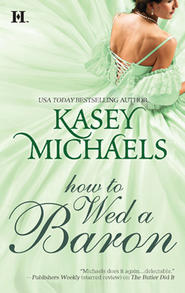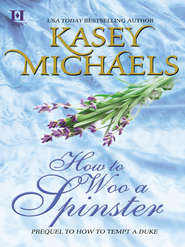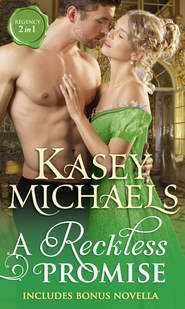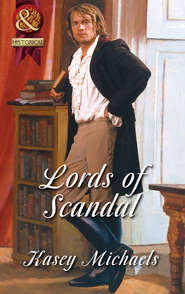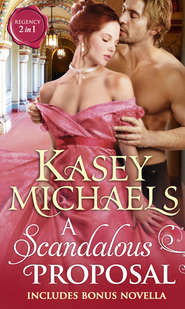По всем вопросам обращайтесь на: info@litportal.ru
(©) 2003-2025.
✖
Lords of Notoriety: The Ruthless Lord Rule / The Toplofty Lord Thorpe
Настройки чтения
Размер шрифта
Высота строк
Поля
“They are mad!” he said of the governments that had a hand in putting Louis on the throne. “The Bourbons in France; they would not be able to hold their position for a year! Nine-tenths of the nation cannot endure them; my soldiers will never serve under them.”
But none of the leaders of the world, their minds filled with plans for pomp and ceremony and grand celebrations, hear the words of Napoleon Bonaparte, or, if they do hear them, heed them.
Only a few shake their heads at the merry-making and wonder—wonder, if this glorious peace is really to be believed. Sir Henry Ruffton, one of the War Office’s most intelligent members, wonders.
Then word reaches Sir Henry of one of Bonaparte’s final statements before leaving France. “Between ourselves,” Napoleon has told a trusted aide who had feared his Emperor would commit suicide, “a living drummer is better than a dead emperor.”
So, while London rings with cheers and hangs bunting from the façades, Sir Henry pens two messages. One missive goes to Sussex by private courier. The other is sent by packet to Calais, to his most trusted operative. Both messages are the same: “Come to me, now.”
CHAPTER ONE
May 1814
“HONESTLY, MARY, that new coachman of Sir Henry’s drives as if he’s riding to hounds.” Gratefully subsiding into a chair in the rather spartanly furnished drawing room, Rachel Gladwin removed her straw bonnet and proceeded to use it as a fan to cool her flushed cheeks. “While I applaud your guardian’s hiring of returned soldiers, I do believe he should temper his generosity with a bit of common sense. I doubt if even Wellington would have survived if all of our troop charges into battle were accomplished with the same reckless fervor our driver just demonstrated on Bond Street.”
Pushing at the dark coppery curls that had been slightly crushed by her fetching, if a bit imprudent, choice of headgear, Mary Lawrence smiled into the mirror that reflected Rachel’s frowning face. “Coming it a bit too brown, aren’t you, Aunt?” she asked, using the courtesy title that lady had insisted upon. “Considering it was you who applauded so enthusiastically when that same driver sent that ridiculous dandy scurrying up the lamppost in fear of his life?”
Rachel’s features relaxed into a small smile. “I will admit to being a bit amused by the spectacle,” she owned cheerfully enough, “but I would be shirking my duty as your resident bear-leader if I did not stress once again that putting one’s fingers in one’s mouth and whistling encouragement to servants is just not done. Wherever did you acquire such a disgusting talent, Mary?”
“In Sussex,” Mary Lawrence replied, leaving the mirror to take up residence in the chair across from Rachel’s. “You’d be surprised at the accomplishments I have mastered through the kind offices of my last keepers, may they live long and prosper. And you are not bear-leading me, no one could. You are my friend and companion while I’m forced to live in London.”
Rachel shook her head. “Still singing the same sad song, Mary? I thought Sir Henry had succeeded in convincing you that this is the best, the safest, place for you at the moment.”
“Bah! All the world is in Paris. The papers are full of ondits about the English lords and ladies who are scampering about France, aping the latest fashions and gambling away their fortunes at the Palais-Royal—among other things,” she ended, winking broadly. “I fail to see why Sir Henry refuses to let me cross the Channel. It’s so dreadfully flat here; I was better entertained in Sussex.”
Looking at the very young, very beautiful girl dressed in the height of fashion, a girl who in her few short weeks in the metropolis had already been dubbed the latest Incomparable, Rachel suppressed a chuckle and tried for a commiserating tone. “La, you poor, oppressed creature. Forced to spend your time dragging yourself from ballroom to theater party, your unwilling body pressed into wearing an endless array of flattering silks and satins, while saddled with the unpalatable chore of breaking every young male heart in London. I daresay I admire you for not dissolving on your bed in a flood of tears, so onerous is your trial.”
Mary screwed up her patrician nose and stuck out her tongue. “Wretch! You know I’m loving every delicious minute of it. It’s just that I should love it even more if I were doing it in Paris. Besides—surely he wouldn’t be so odious as to follow me there to make my life miserable.”
“Ah, we’re back to that, are we?” Rachel chuckled, shaking her head. “My nephew seems to have gotten under your skin.”
“Like an annoying splinter,” Mary admitted irritably. “How that insufferable man dogs my every step! If you’re afraid of the way our coachman drives, I am fearful that your odious nephew is going to drive me—into strong hysterics. Are you quite sure he wasn’t a soldier, perhaps suffering from some head injury that makes him behave so toward me?”
“Tristan was never a soldier, Mary,” Rachel replied, crossing her fingers in her lap. “There have been rumors about his actions during the war, but I discount them. No, my nephew is just being his usual annoying self.”
Mary looked closely at her companion. “You sound as if you don’t like him. Not that I blame you, of course, for he does not wear easily.”
Rachel smiled sadly. “Not like him? Why, Mary, I couldn’t love him more. Tris is loyal, trustworthy, unflinchingly honest and the staunchest friend a person could ever have.”
“I once had a terrier with the same attributes.” Mary sniffed derisively. “Only he was better trained. All your nephew seems to have mastered is the ability to heel! Besides, if Lord Rule is such a paragon of virtue, why do you always give such a deep sigh when you see him? Seems rather unloving to me.”
Now the older woman laughed aloud. “Because he’s such a royal pain in the rump, Mary dearest, why else?”
Mary decided to change the subject, as their discussion of the Right Honorable Baron Rule was fast beginning to give her the headache. She rose and walked over to take the card rack down from the mantel, meaning to sort out the cards of invitation for the one she needed for that evening. “We’re expected at Lady Salerton’s for her daughter’s come-out. Shall I wear my yellow tiffany?”
“Not unless you want Elsie Salerton to throw her not unimpressive bulk against the door to bar you from entering. Really, Mary, can you not let the poor girl have her evening without spoiling it by ensnaring every young buck her mother is bound to have cajoled, blackmailed or bludgeoned into appearing?”
Mary smiled, showing up the very fetching dimple in her left cheek, then batted her large, wide green eyes innocently. “Why, Aunt, whatever do you mean? I merely enjoy dancing and chatting with people my own age. Anyone would think you believe me to be a heartless flirt.” Her smile fading, she added, “Besides, once your dear nephew, Lord Rule, comes on the scene—which I am sure he will do as he seems to have an uncanny knack for knowing exactly which entertainment I have chosen for the evening—all my intrepid dancing partners will depart posthaste for the hinterlands, their tails between their legs.”
“Maybe he’s developed a tendre for you, dear,” Rachel offered without much hope of being taken seriously.
“Not surprising. Who hasn’t fallen head over ears for my beautiful ward?”
“Uncle Henry!” Mary cried, running across the room to give her guardian an enthusiastic hug. “Aunt Rachel has told me you have gotten us vouchers for Almack’s. However did you manage it?”
The gray-haired, rosy-cheeked cherub who stood smiling inanely while his adored ward embraced him was Sir Henry Ruffton, a wealthy bachelor on the shady side of forty with a reputation as a truly guileless, completely lovable soul. That he had the total admiration of his ward was obvious, and he felt the years fall away from him as he basked in her affection. “Silly puss, who could afford to ignore such a diamond of the first water as you? Not Lady Jersey, that much is certain. Besides, I do have a smattering of friends who were not adverse to pulling a few strings in the right places.”
Rachel watched the scene unfolding in front of her, a sad smile on her face. Mary could have been his daughter, could have been their daughter, if only… “Henry, I do believe you’re blushing!” she teased, rising to ring for refreshments.
Seating himself in his favorite chair, allowing Mary to curl up on the floor at his feet, her head pressed against his knees, Sir Henry acknowledged Rachel’s words unself-consciously. “I admit it, Rachel, my dear friend. I have not been so diverted in years. Having Mary join me in the city was truly an inspiration. And finding you after all this time to act as companion and chaperon, why there are times I believe myself to be the happiest of men.”
“Don’t forget that the war is over, Uncle,” Mary pointed out. “That’s another reason for you to be happy.”
“Napoleon is within spitting distance of Europe, child,” he answered, suddenly looking something less than cherubic. “I cannot help but agree with Talleyrand, who fought to have Bonaparte exiled in Corfu, or even St. Helena, where he could be more closely guarded.”
“Piffle,” Mary argued. “Fouché, I’ve heard, suggested Boney flee to America and start over. I wonder how the Americans would have taken to that notion. Besides, Talleyrand is no good authority. I have read that Napoleon once called him ‘filth in silk stockings.’”
“Talleyrand is an amoral thief, Mary, but he hasn’t survived in France this long without being a fairly good judge of men. If he says Bonaparte still presents a danger, I tend to believe him.”
“But—”
“Enough, child. You make my head buzz with all your silly prattle. I have given you my reasons and you have agreed to abide by my decision. Once some time has passed, and the governments conclude their deliberations, perhaps then I shall set you off to France with my blessing. I may even accompany you. But for now—”
“But for now I am safer in London,” Mary ended fatalistically. “But all this pretense, I vow I cannot like it. Even my name—”
“Perkins!” Rachel interrupted rather loudly, startling the butler into nearly oversetting the tray of tea and cakes. “How famished I am. If you would set the tray on this table I’m sure we shall be able to serve ourselves quite well unaided. Thank you, Perkins.”
Mary watched the butler’s departing back, a rueful smile on her lips. “I almost gave it away just then, didn’t I, Aunt? Thank you for your timely intervention.” Then, momentarily feeling mulish, she added, “Though I still think this whole deception is silly.”
Rachel and Sir Henry exchanged knowing looks over Mary’s head and pretended not to hear her last statement. Biting into a warm scone, Sir Henry questioned, “Which one of Mary’s suitors were you discussing when I entered the room? It’s getting to the point where I have to keep a list with me at all times so that I may check them off when I am forced to turn down their requests for her hand.”
Mary thrust her full lower lip forward into a pout. “Lord Tristan Rule, Uncle Henry, and he is not a suitor. He’s a nuisance!”
“Tristan?” Sir Henry repeated, puzzled. “I’ve never known him to be in the petticoat line. My congratulations, my dear, he’s a fine young man.”
Mary leaped to her feet and glared at her beloved guardian. “If you have any affection for that fine young man, you will steer him swiftly away from my direction before I skewer him with my parasol! I cannot stand the creature!”
And with that, Mary quit the room, stopping only to snatch up a few fragrant scones, leaving Rachel to explain Lord Rule’s recent behavior to Sir Henry.
TRISTAN RULE REACHED DOWN a hand to assist his opponent to his feet. “Sorry, George. It seems my tiresome temper has gotten the better of me again.”
“On the contrary,” Lord Byron replied, gingerly rubbing his aching jaw, “it was my fault entirely. I should have known better than to cast aspersions on our esteemed War Office while sparring with Ruthless Rule. Besides, I thought I had a better chin than I seem to possess. Just remember, Tris, the pen is mightier than the sword. I’ll simply have to scribble a canto or two someday about our esteemed military gentlemen.” Stepping out between the ropes held apart by his friend, Byron called out ruefully, “Tom, my good man, you’d better look to your laurels now that Ruthless Rule is stepping into the ring. I do believe he would make even you a fair competitor. Now toss me that towel and help me totter over to find a glass of wine, if you please.”
Dexter Rutherford, who had been holding a towel at the ready for his idol, Lord Tristan Rule, dashed to the side of the ring, a look of slavish adoration on his young face. “What a leveler you served him, Tris!” he exclaimed, rubbing his hero’s bare shoulders with more enthusiasm than expertise. “The great man himself, dropped by a single blow. What science, what speed, what—”
“What loss of control,” Tristan ended crossly, effectively wiping the grin from Dexter’s face. “We were only sparring, you bloodthirsty infant. George wasn’t expecting that bit of home-brewed I served up to him. Thank goodness he’s a gentleman.” Taking the towel from his shoulders, Rule rubbed it briskly across his face and neck. “It’s this deuced inaction, I feel like a coiled wire ready to spring. I can see that this peace everyone is so delirious about is going to take a bit of getting used to.”
Tom Cribb, the retired “Champion Boxer of all England,” approached the pair, a nearly full glass of wine held in front of him. “With Lord Byron’s compliments, my lord. And may I say it was an honor to watch you in there. If you ever have a mind to go a few rounds, I wouldn’t say no to you. Your right hand reminds me a bit of Ikey Pigg’s, and I considered him a very worthy opponent in his day.”






